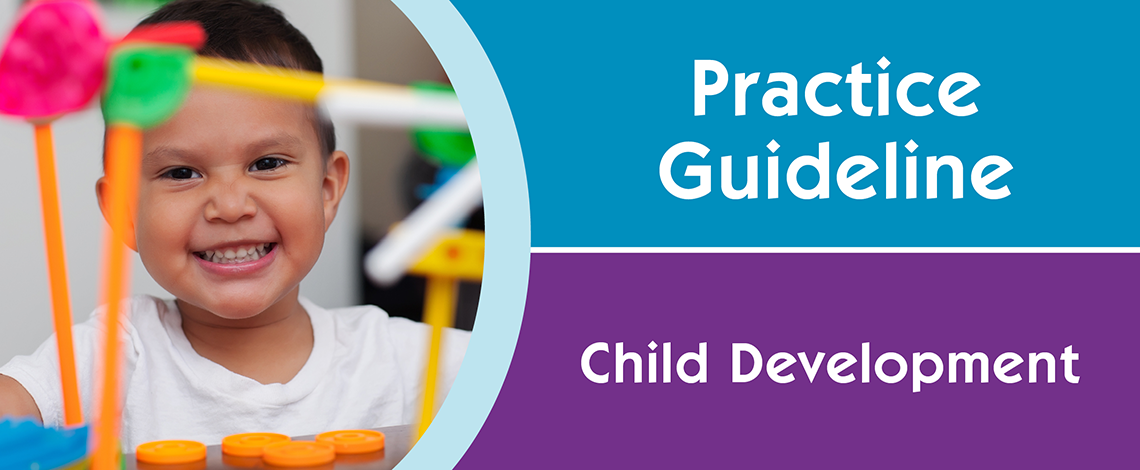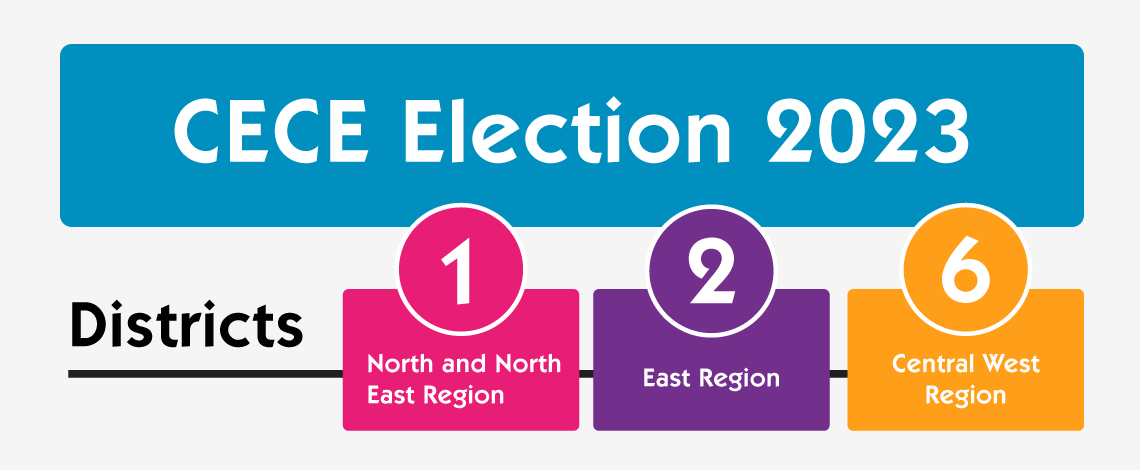Employer Newsletter – Fall 2022

New Practice Guideline on Child Development
Fostering children’s holistic development and well-being is foundational to an RECE’s practice and reflects their unique expertise and experience.
RECEs are familiar with the common developmental domains and continually seek to develop a deeper understanding of child development in their work with diverse children, families and communities. These domains, listed below, are linked as they support and influence each other:
- Social and emotional;
- Communication and language;
- Cognitive; and
- Physical
In summer 2022, the College published the Practice Note on Child Development, a resource to support RECEs to reflect upon their responsibilities and practices and strengthen their knowledge of ways to promote the developmental domains, such as through relationships, co-creation of environments and curriculum. This fall, we launched the first three sections of the Practice Guideline on Child Development and we will be rolling out the remaining sections in the coming months.
What is the Practice Guideline on Child Development:
The practice guideline on child development is framed around the understanding that each child develops in unique ways and within diverse family structures, communities and cultures. It is also grounded in the idea that educators, families and communities are partners in supporting children’s development.
Standard I describes collaborative relationships with families as being essential. It says that RECEs recognize the value and diversity of all families who “are of primary importance in children’s development and well-being. [Children] are best understood in the context of their families, cultures and communities” (Standard I: B.3).
Employers can support RECEs to consider new ideas and approaches through collaborative critical reflection with these latest resources to strengthen their practice and enhance programs for the children and families they work with.
Some ways employers can support staff:
- Use staff meetings to allow for collaborative engagement and learning: Staff meetings are an opportunity for RECEs and staff to discuss, learn and collaborate. Together, review the content in the Practice Guideline on Child Development. Encourage staff members to lead or facilitate discussions on this topic. This will build their leadership skills, confidence and may also contribute to their Continuous Professional Learning goals.
- Bring awareness to the College resources: Use employee communication platforms to announce this news, and other resources that are available to RECEs at no cost.
Coming Soon:
Stay tuned to sections 4 and 5 that will be launching in the coming months on our website.

Election 2023: Role and responsibilities of Council and Council members
Election season is fast approaching at the College. As an employer, you know your team’s skills, experience and goals. You’re in a position to identify exceptional candidates and encourage them to consider running for election to Council.
The College is governed by a 24-person Council that includes 14 RECEs elected by members, who serve 3-year terms. Elections will be held in 2023 in the North and Northeast Region, East Region, and Central West Region. Nominations open in December 2022.
Diversity and inclusion are essential in governance and leadership to bring the perspectives and experiences necessary to effectively govern a profession as diverse as the children and families of Ontario. The College’s Commitment to Anti-Racism informs all of our work and RECEs with related expertise or who identify as members of marginalized communities are particularly encouraged to consider running for Council.
Council members strengthen their understanding of governance, help establish the College’s professional standards, and uphold its regulatory mandate of protecting children and families.
Council is responsible for:
- Protecting the public interest by establishing entry to practise requirements, ethical and professional standards, and processes for addressing professional misconduct and incapacity;
- Regulating the profession by overseeing policy development and the administration of College affairs.
Council members are responsible for:
- Attending Council meetings;
- Serving on committees; and
- Setting aside time to read the agenda and meeting materials prior to the meetings.
Council members are required to participate in 10-20 meetings annually and possibly more depending on the member’s involvement in committees. Meetings are held during business hours and Council members receive a per diem honorarium intended to recognize their participation and to partially off-set the cost of their contribution to the profession of early childhood education.
When an RECE on your staff is an elected member of Council, they bring that experience back to their workplace, which is a benefit to you. They will gain in-depth knowledge of professional self-regulation, the Code of Ethics and Standards of Practice, along with changes in legislation and regulation. This, in combination with the leadership skills and experience they will build on Council, can strengthen and enhance the practice of everyone on your team.
Take Action
If you know of an RECE who would make a great candidate for Council, encourage them to submit their nomination.
Nominations open on December 14, 2022.
For more information and election updates, visit our website and share it with your RECE staff.

Mental Health Resource Centre now available for RECEs
To nurture and care for others, RECEs need the opportunity to nurture and care for themselves. The College of Early Childhood Educators is proud to offer our members an innovative program, addressing some of the challenges we’ve heard from them, and prioritizing the mental health and wellness needs of all RECEs.
Supporting the mental health of our members is critical to enabling high quality practice and ensuring the sustainability of the profession, and that is why the College has partnered with People Connect to provide convenient access to wellness resources, at no cost to RECEs.
People Connect is an online service that provides members with access to the following confidential services:
- An online mental health self-assessment tool, to understand symptoms of mental health conditions;
- Virtual mental health therapy, to connect RECEs with a therapist of their choice; and
- Information and a resource library, for credible mental health information, tips and tools.
We have informed our members about People Connect and how to access this valuable resource, and we encourage employers to continue to share this information with RECEs on their teams. Click here to download a poster that can be printed and posted in the workplace as a reminder to RECEs about the People Connect platform.
How can RECEs access the service?
RECEs can simply create an account, log-in and get started.
Our partnership with People Connect offers convenient access to wellness resources, making it easier for everyone to access self-care and mental health support.
Who can access the service?
ALL RECEs have access to the service and are encouraged to take advantage of the resources People Connect has to offer.
*No personal information such as who accesses the service, is shared with the College or employers.

Highlights from Trauma Informed-Care Workshop for Employers
This past September, the College of Early Childhood Educators (the College) facilitated live workshops on trauma-informed care, specifically for employers. The workshops focused on offering ways you may support the RECEs in your setting with completing the Sexual Abuse Prevention Program, as well as supporting you in understanding any reactions that you or others might have when engaging with the prevention program content.
The workshop was developed in collaboration with the Ontario Coalition of Rape Crisis Centres , and focused on the following topics:
- Trauma-informed care
- Trauma responses
- Processing and dealing with triggers
- Question period
Here are some highlights:
While RECEs in your setting complete the Sexual Abuse Prevention Program, consider sharing some of the strategies below. For example, RECEs can complete the program:
- alone, in groups, or with a trusted person;
- in multiple sessions instead of all at once;
- without listening to the testimonials in the Canadian Centre for Child Protection’s Commit to Kids modules, which are not required for completion;
- with a plan of who they can reach out to in the event they experience distress – a trusted friend or family member, or crisis centre.
As an employer, you know staff and can offer guidance and support in some of the following ways:
- Encourage RECEs to engage in reflection and dialogue with colleagues in their network. This can enhance learning and provide additional support.
- Consider checking in with your staff as they engage or re-engage with the content.
- Consider options for RECEs who may not want to complete the program as a group.
- If a staff needs professional support, have the resources readily available so you can share with them. See below for some resources.
Resources for you and to share with staff:
- Caring for Self and Others:
- Mental Health Resource Centre (People Connect) for RECEs
- Instructions for Completing the Sexual Abuse Prevention Program and Confirming Compliance
- Sexual Abuse Prevention FAQs